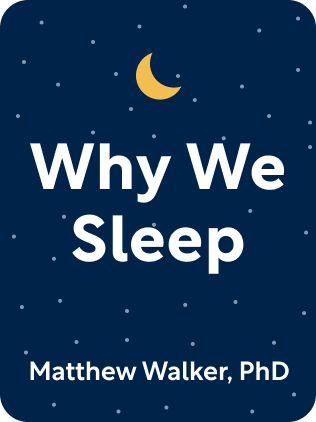

This article is an excerpt from the Shortform summary of "Why We Sleep" by Matthew Walker. Shortform has the world's best summaries of books you should be reading.
Like this article? Sign up for a free trial here .
Is sleep in the elderly different than sleep at other ages? Are the elderly at a higher risk of sleep-related disorders?
Sleep changes with age, and sleep in the elderly is no exception. Unfortunately, sleep in the elderly is characterized by declining sleep quality and difficulty sleeping. Sleep in the elderly can also have physical, mental, and emotional side effects, and sleep should be an important part of your health plan at any age.
Sleep in the Elderly: Why Sleep Changes and What It Means
Sleep is universal in animals (even in insects and worms). This deep biological alone suggests a vital function and that it isn’t simply a vestigial byproduct of evolution.
Humans in today’s nutrient-rich environment need 8 hours of sleep to function optimally.
- True low-sleepers (people who can chronically sleep < 6 hours per night, without impairment of function) are incredibly rare, at less than 1% of the population. Everyone else is disguising their sleep deprivation with caffeine and sleeping pills.
- Insidiously, you’re very bad at objectively assessing your decrease in performance under sleep deprivation. When sleep-deprived, you think you’re performing better than you really are.
- Fasting and starvation does lower sleep, which is why hunter-gatherer tribes show 6.5 hours of sleep. This fact is then inappropriately picked up by popular media as evidence that it’s natural. But when resources are plenty, your body naturally wants to sleep more.
Sleep has two general types – NREM and REM.
- NREM occurs earlier in the sleep phase, while REM is concentrated later.
- NREM is slow (~2Hz) (like billions of neurons singing in synchrony) while REM is fast (50Hz) and looks like being awake.
- NREM is responsible for pruning memories, transferring short-term memory to long-term memory, gaining “muscle memory,” growth hormone secretion, and parasympathetic nervous system activation.
- REM is responsible for forming new neural connections, problem solving, dreaming, blunting emotional responses to painful memories, reading other people’s facial emotions, and neonatal synaptogenesis.
- Both are generally necessary – depriving a person of either one leads to different problems.
Sleep in Adulthood/Old Age
Sleep in the elderly is affected by several factors. Quality starts deteriorating in the late 20s, with deep NREM sleep becoming impaired in length and power. In your late 40s, you’ll have lost 70% of deep sleep as a teenager; by 70, you’ll have lost 90% of deep sleep. Unfortunately, less NREM sleep worsens the ability to cement new memories in older people.
You often hear of the elderly sleep problems including sleeping little at night, so the natural conclusion is that the elderly just need less sleep. But this could be a myth. The elderly might be sleeping less because they’re unable to sleep for as long. This means they could still benefit from more sleep.
Seniors have three things going against them that create elderly sleep problems: 1) they sleep less, 2) they have less efficient sleep, and 3) they want to sleep earlier. This is caused by:
- Degeneration of the mid-frontal cortex that generates sleep
- Circadian rhythm shifting to earlier times
- Weakened bladders causing night interruptions
Exacerbating this are:
- We’re generally unable to determine our sleep quality after sleeping. So when seniors sleep poorly and feel unhealthy, they don’t realize they need to improve their sleep quality. They chalk it up to insomnia.
- Because the elderly sleep poorly, they feel tired during the day, and doze off in the early evening. Unfortunately, this reduces the adenosine sleep pressure at night, which causes them to have trouble falling asleep later. Then, their early circadian rhythm wakes them up before they can get a full night’s rest. This causes a vicious cycle of poor sleep.
All this causes lower sleep efficiency – people in their 70s have 80% sleep efficiency, meaning they stay awake in bed for 1.5 hours when trying to sleep 8.
There are a few ways to get around this:
- Melatonin helps strengthen the desire to sleep in elderly people. It reduces time to falling asleep and improves reported sleep quality.
- Seniors who want to push their circadian rhythm back should get bright-light exposure in the late afternoon, not in the mornings.
Sleep Deprivation May Contribute to Alzheimer’s
While no definitive causal link has been shown yet, elderly sleep problems may include Alzheimer’s. Sleep losses may contribute to Alzheimer’s through a few mechanisms:
- Frontal lobe degeneration (especially through Alzheimer’s characteristic amyloid plaques) disrupts NREM sleep.
- Lack of NREM sleep disrupts memory formation, a key symptom of Alzheimer’s.
- (Notably, the hippocampus is not affected by amyloid plaques, presenting a conundrum to scientists on why memory is disrupted in Alzheimer’s.)
- Lack of NREM sleep disrupts the lymphatic cleanup system, during which glia shrink to less than half their normal size and amyloid plaques are cleared out more readily.
It’s easy to see how a vicious cycle can occur in sleep in the elderly- frontal lobe degeneration disrupts NREM sleep, which causes further frontal lobe degeneration.
Sleep loss precedes Alzheimer’s by several years, suggesting this could be an early diagnostic.
Encouraging NREM sleep, through artificial brain stimulation if needed, might be therapeutic for Alzheimer’s. It could also be prophylactic, the same way statins protect against heart disease.
Sleep in the elderly is more important than ever, but also carries many more risks of complications. If you’re concerned about sleep in the elderly, for yourself or someone you know, it’s always best to consult a medical professional.

———End of Preview———
Like what you just read? Read the rest of the world's best summary of Matthew Walker's "Why We Sleep" at Shortform .
Here's what you'll find in our full Why We Sleep summary :
- Why you need way more sleep than you're currently getting
- How your brain rejuvenates itself during sleep, and why nothing can substitute for sleep
- The 11-item checklist to get more restful sleep today






